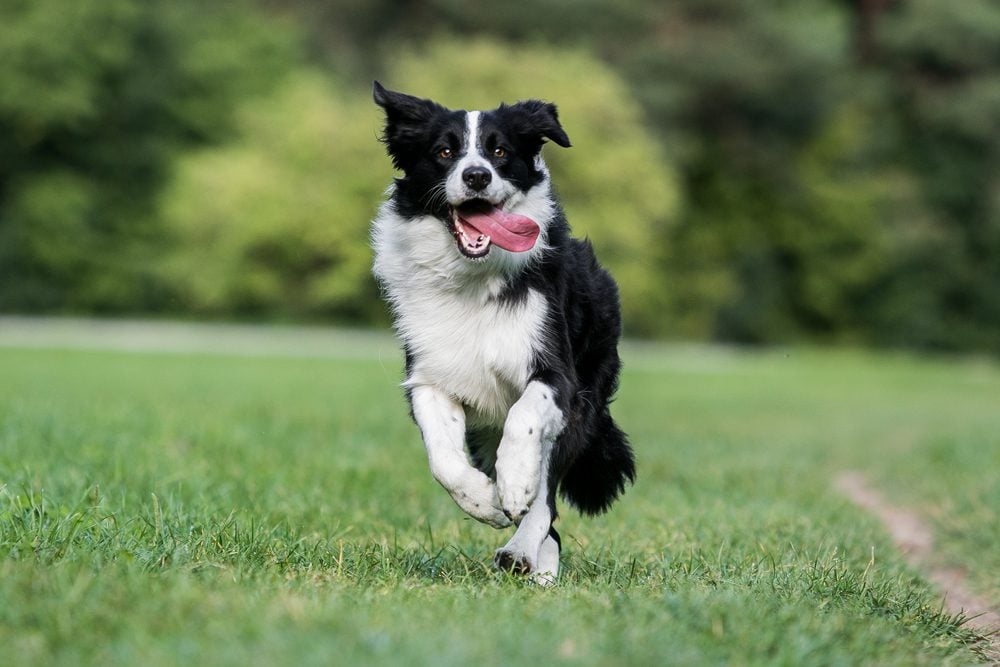Border collies are one of the most popular breeds of dogs today, known for their energetic spirit and hard-working nature. Because of their high intelligence and need for mental stimulation, this breed is often a top choice for working as a service dog, where they can support their owners and perform daily tasks.
Our article gives you more information about border collie service dogs and answers frequently asked questions about this lovable working pup.
What Is a Service Dog?
A service dog is defined by the Americans with Disabilities Act as a dog of any breed or size that is trained to perform a task that directly relates to an individual’s disability. Service dogs may support their owners and provide mobility balance, help retrieve medication and phones, guide their owners, or provide therapeutic support.
Service dogs may help with a wide range of disabilities such as visual impairment, hearing impairment, anxiety, depression, PTSD, and medical conditions such as diabetes, heart conditions, and seizures.
Types of Service Dogs
There are a few different types of service dogs, and each category of service dog performs slightly different tasks to support their owner and relieve specific symptoms of the owner’s disability. You may encounter mobility, guide, psychiatric, or medical alert service dogs, all of which are highly trained to assist their owner throughout their daily lives.
Examples of some of the tasks that these pups may perform include:
- Mobility and guide service dogs: guiding those with visual or hearing impairments, providing balance support, retrieving items, supporting their owner’s weight
- Psychiatric service dogs: checking rooms and corners for their owners, interrupting harmful behaviors, calming panic attacks, providing deep pressure therapy, retrieving medication
- Medical alert service dogs: Alerting their owners to drops in blood sugar or blood pressure, detecting oncoming seizures or heart problems, guiding their owners to a safe space, retrieving medications and phones, alerting others for assistance
Of course, this list is not exhausting, as service dogs may perform many other tasks to support their owner’s disability. The tasks a service dog is trained to complete are variable and often customized to an individual’s specific needs.
Service Dogs Versus Emotional Support Animals
It’s important to note that service dogs and emotional support animals are two different classifications of helpful companion animals. While service dogs are trained to perform tasks that directly relate to an individual’s disability, emotional support animals provide support through their companionship and comforting presence.
Because of this, emotional support animals are not granted the same public access right as service dogs, though they do have the right to live alongside their owner in whatever space is necessary. You can read more about these rights for emotional support animals in the Fair Housing Act.
The History of the Border Collie
The athletic border collie has a long history of working alongside humans, primarily as a sheep herding breed. This dog thrives in the outdoors, and they have plenty of energy and a hard-working attitude that keeps them eager to learn new things and work alongside their owners daily. Border collies are known for their loyal nature, intelligence, high level of trainability, and agility.
Today, border collies are often seen as family pets for those that can keep up with their energetic nature. However, they still maintain a solid place working on farms to herd animals and provide their assistance to humans.
Are Border Collies Good Service Dogs?
Border collies tend to make excellent service dogs due to their high level of intelligence and skill in learning new tasks quickly. This is a breed that is eager to please its owner and enjoys being put to the test as they learn new skills and complete daily tasks for their owners. Border collies are loyal, dedicated, and affectionate, and they will enjoy being by their owner’s side as they provide support.
Border collies are especially suited to tasks such as guiding or providing mobility support due to their larger size, and they can easily be taught to retrieve important items such as medications, phones, and water. This breed is also very vocal, and they will have no problem barking to alert their owners of a problem or to gain the attention of others when needed.
Tasks That Border Collies Can Assist With
Border collies are very intelligent and take to training easily in most cases. A border collie service dog may complete any of the following tasks:
- Opening and closing doors
- Retrieving items such as medication, water, remotes, and phones; or putting these items back
- Alerting their owner to sounds or danger
- Alerting their owner to oncoming medical issues
- Guiding their owner or providing balance and mobility support
- Calming their owner during panic attacks
- Interrupting harmful behaviors and redirecting focus
- Provide medication reminders
- Guide their owner to a safe space in public
- Alert others to a problem with their owner and bring assistance to their owner
Keep in mind that service dog tasks are often dependent on the owner and their specific disability; you may see border collie service dogs complete additional skills than the common ones that are listed above.
How Can I Get a Border Collie Service Dog?
If you have a disability and are interested in adding a border collie service dog to your treatment and care plan, you may wonder how to go about this.
The first step in adding a border collie service dog to your life is consulting with your therapist, doctor, or other medical professional to determine if a border collie service dog is the right choice for you. From there, you can start researching organizations that train service dogs, specifically border collies. Then, you can work with these organizations to obtain a border collie service dog and complete training with your dog, enabling you to start building a bond with your pup. Once training is complete, you and your service dog will be able to start your lives together as a team.
Can I Train My Own Border Collie to Be a Service Dog?
Obtaining a border collie service dog that’s fully trained might be cost-prohibitive for some, and you might find it difficult to locate a border collie service dog that is fully trained.
In these cases, you may be able to train your own service dog as long as you are willing to put in the time and patience necessary for this process. Adopt a border collie service dog from a local rescue or adoption facility, and then list the tasks you need your pup to complete. Then, work with your dog daily to train them to complete these tasks. Fortunately, border collies are quite intelligent, so they should pick up the tasks you need them to complete fairly easily.
FAQs About Border Collie Service Dogs



Service dogs often raise many questions for those interested in adding one of these helpful working companions to their lives or who want to learn everything a border collie service dog may do.
Review the answers to our frequently asked questions about border collie service dogs to put your concerns about this working pup to rest.
Is a Border Collie Service Dog Right for Me?
It’s important to evaluate whether or not you can properly provide for a border collie service dog and if you have the ability to seamlessly integrate this working pup into your care or treatment plan.
Border collies need quite a bit of exercise and mental stimulation to stay happy, and you should be able to financially care for your dog (including regular vet visits and emergency appointments) in addition to providing for them physically.
When you meet with your therapist, doctor, or another medical professional initially, they should help you explore if a border collie service dog is the right option for your specific situation.
What Is the Cost of a Border Collie Service Dog?
Border collie service dogs can be quite expensive, as fully trained service dogs typically start training as puppies and undergo regular intensive training to ensure they are well-behaved and equipped to support those with disabilities.
For a fully trained service dog, you may expect to pay between $10,000 to $50,000, depending on your location, the tasks you need your dog to complete, and the organization you are working with.
Will Insurance Cover My Service Dog?
Insurance varies greatly by person and by the plan that you are enrolled in, and you will need to check directly with your insurance company about whether or not they cover the costs for your service dog.
Certain insurance plans may pay for a portion of the costs, as some plans consider service dogs essential medical equipment, but other plans won’t provide any kind of assistance as you work to adopt or train a service dog.
If you do need financial help obtaining a service dog, it’s a good idea to research local or national scholarships and funding assistance. There are typically organizations that help to provide aid for individuals with disabilities that require service dogs but may not have all of the funds to adopt one of these wonderful working companions.
Can I Take My Service Dog Everywhere?
Service dogs are granted public access rights by the Americans with Disabilities Act (ADA), and you can take your service dog with you wherever you need to, including in places that don’t typically allow dogs, such as restaurants, hotels, and shopping centers.
You are not required to show proof that your dog is a service dog, demonstrate tasks, or answer any questions about your disability when accessing public facilities with your service dog. Any business that tries to deny your right to enter the facility with your service dog may be in violation of the ADA, depending on the situation.
Do I Need to Identify My Border Collie Service Dog?
The ADA does not require owners to have certifications, licenses, or any other identification on service dogs. That being said, many individuals with service dogs do choose to use a vest or marked leash to identify their companion as a service dog and set expectations for anyone that sees the dog on how to behave – most people who see a service dog working in public will leave the dog alone and allow it to do its job.
It’s up to you whether or not you wish to publicly identify your border collie service dog as a service dog.
How Can I Spot a Fake Service Dog?
If you are out and about and see a service dog in public, you may wonder if that dog is a real service dog. After all, in recent years, there has been an increase in individuals passing their pets off as service dogs or emotional support animals and taking advantage of the rights granted by the ADA and the Fair Housing Act.
Spotting a fake service dog isn’t typically difficult, as the dog will be poorly behaved, easily distracted by people and things around it, and occasionally destructive. They may greet people that pass by, happily accept food and toys, use the bathroom wherever, and ignore their owner’s commands.
In general, if a business encounters a dog causing problems or endangering others in their facility, they are allowed to refuse the dog entry, regardless of whether or not the dog is a legitimate service dog.
Gaining the Service Dog Assistance You Need
Service dogs are an important part of many individuals’ lives, and the border collie breed makes for a reliable, loyal, and helpful service dog companion. Border collies are affectionate, intelligent, and love to complete tasks alongside their owners, which makes them great candidates for completing service dog tasks.
If you want to add one of these excellent working dogs into your life, reach out to a licensed medical professional to start the process of determining whether or not a border collie service dog is right for you.
